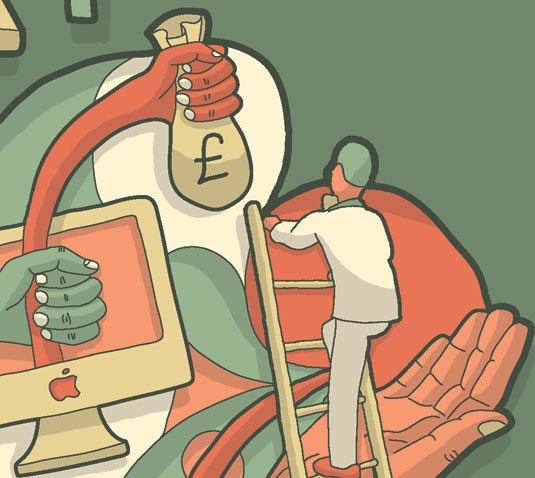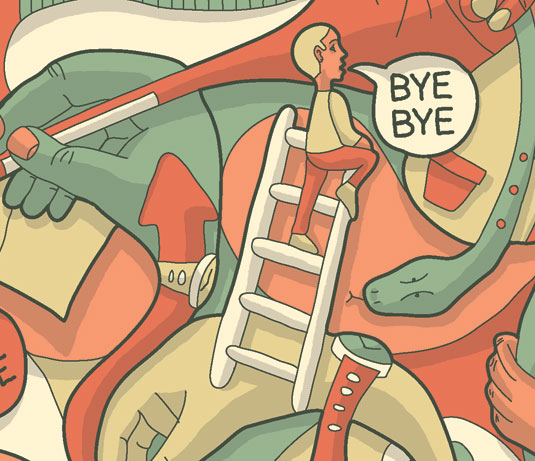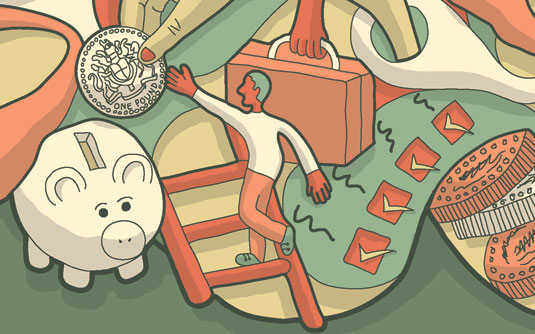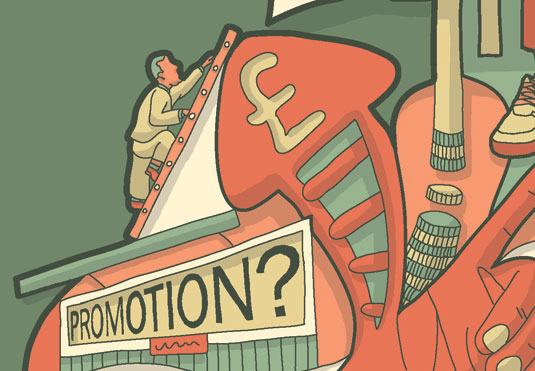How to get a promotion: 15 tips
Not happy with your design job? Follow these simple steps and you could be moving up the ladder faster than you think.
So you'd like to move up in the world and discover how to get a promotion? Well, who doesn't? Wanting something and actually getting it are two completely different things - but there are things that you can put into practice right now that can help you get that job promotion. Follow these 15 top tips...
01. Assess where you are now

Ask yourself what your current role involves and what skills earned you the position in the first place. These are your core career strengths and any promotion needs to be based upon them. Think about how you can build on these skills, and how you can outgrow your current role - remember that most promotions come when a candidate is too experienced for their current job and too invaluable to lose.
02. Shine in what you do
You'd be shocked how many people think that the fast route to promotion is doing the job they want to be doing rather than the role they should be doing. But if your boss can accuse you of not fulfilling your current job description, why would they offer you a more advanced one?
Look at your job description and make sure you're performing each and every element of it to the utmost of your ability. Even if some of these areas are dull, don't ever be tempted to write them off.
03. Decide where you want to go
Identify what role you want to be promoted to. This could be pretty obvious - for example, from designer to senior designer - but either way it's important to have a reference point to aim for. Now ask yourself what extra skills you need in order to do that job. Are there any gaps in your skill set? If so, fill them...
04. Get a mentor
Perhaps you're a designer or artworker looking to move into a senior creative position, or an in-house illustrator wanting to take a lead role on projects. For the time being, you can't (it's not your job) but why not ask to shadow someone whose responsibility it is? Not only does this demonstrate eagerness, but it also enables you to see if you really want to hop onto the next rung of the ladder.
05. Be keen to learn

While a mentor might be able to give you insight into a more advanced role, the one thing no one can stop you from doing is building on your industry knowledge. If you're one of those designers who hasn't the faintest idea what ROI is or how accounts are won (and lost), then it's time to find out. A more rounded knowledge of the creative industry and the way in which your company functions is essential for moving up the corporate ladder.
06. Measure your past successes
Take a look over the items in your portfolio and identify the biggest projects that you've worked on to date. Now try to measure these. For example, how much revenue did they generate? How smoothly did the creative process go?
When you've done that, highlight these successes by writing up a post-project debrief that analyses what worked on the project and why it worked, and how your company can use these lessons for other clients. A memo or best-practice document will serve as a constant reminder to your boss of your achievements.
07. Brag
No, this doesn't mean a victory lap each time a project is signed off, or incessantly referring to your work in the pub. It means taking satisfaction in your achievements and ensuring your manager is aware of them. If you receive positive feedback from a client, send it on to your manager. Don't be a bore, but do elicit a sense of pride in your work; it won't go unnoticed.
08. Be a specialist

Has your employer got an app specialist, mobile maestro or someone who knows the print production process inside out? If not, become that person. Spot a gap in your company's collective knowledge and become the expert in that particular field. If it turns out to be a financially profitable one, then you might even be able to create your next role rather than relying on someone else to vacate.
09. Volunteer
Who organises your office Christmas party, day trip or social event? Who restocks the printer when it runs out of paper, orders replacement Wacom nibs or picks up loose ends that management often forget about? If it's not you, then it's someone earmarked for promotion, because all of these things - even the most mundane of office tasks - require valuable leadership skills.
10. Just ask
There's a fine line between being forward and being a pain in the backside, as all managers know. Yes it's great to show initiative, to volunteer and equip yourself with new skills, but if your line manager has no idea you want a new role, then you need to make it plain.
Be warned, though - if there was a need, the chances are it would already be advertised, and braying about your promotion-meriting skills and achievements week in, week out is a sure-fire way to raise your manager's hackles. Be concise and direct. Don't be brash and pushy.
11. Get networking

Being good at what you do is only half the equation. Like it or not, in the real world, people tend to hire and promote people they know and trust. So you need to start networking with people around your organisation. Follow our tips on networking with design professionals in this article.
12. Make a name for yourself
Networking outside of your organisation, both physically and through social networking, can also help your cause within it. Making a name for yourself through a blog, a side project or a Dribbble account can help raise your profile within your company - although make sure you don't cross the line in terms of acceptable activities outside work, particularly when it comes to business confidentiality. Follow our tips on successful side projects in this article.
13. Sharpen your interview skills
If you apply for a higher-level job within your organisation, you'll probably be interviewed by people you know well and may consider friends. But that doesn't mean you shouldn't prepare for the interview any less than if you were visiting another firm. Your interviewers will be treating it seriously, so make sure you do to. Follow our tips for job interview success here.
14. Sharpen your portfolio
The same point that applies to your interview applies to your portfolio. Update it, tighten it up and bring it along in case your interviewer wants to refer to it. Follow our tips for creating a great portfolio here.
15. Further reading
For more advice and tips from the experts, as well as sources of inspiration, you'll find all our career related articles listed here. and you can join our LinkedIn Group. Best of luck, and let us know when you get that promotion!
Illustrations: Sweaty Eskimo
Liked this? Read these!
- The designer's guide to working from home
- Create a perfect mood board with these pro tips and tools
- The best free script fonts
Have you recently bagged your dream design promotion? Let us know your thoughts and tips in the comments box below!

Thank you for reading 5 articles this month* Join now for unlimited access
Enjoy your first month for just £1 / $1 / €1
*Read 5 free articles per month without a subscription

Join now for unlimited access
Try first month for just £1 / $1 / €1
Get the Creative Bloq Newsletter
Daily design news, reviews, how-tos and more, as picked by the editors.

The Creative Bloq team is made up of a group of design fans, and has changed and evolved since Creative Bloq began back in 2012. The current website team consists of eight full-time members of staff: Editor Georgia Coggan, Deputy Editor Rosie Hilder, Ecommerce Editor Beren Neale, Senior News Editor Daniel Piper, Editor, Digital Art and 3D Ian Dean, Tech Reviews Editor Erlingur Einarsson, Ecommerce Writer Beth Nicholls and Staff Writer Natalie Fear, as well as a roster of freelancers from around the world. The ImagineFX magazine team also pitch in, ensuring that content from leading digital art publication ImagineFX is represented on Creative Bloq.
